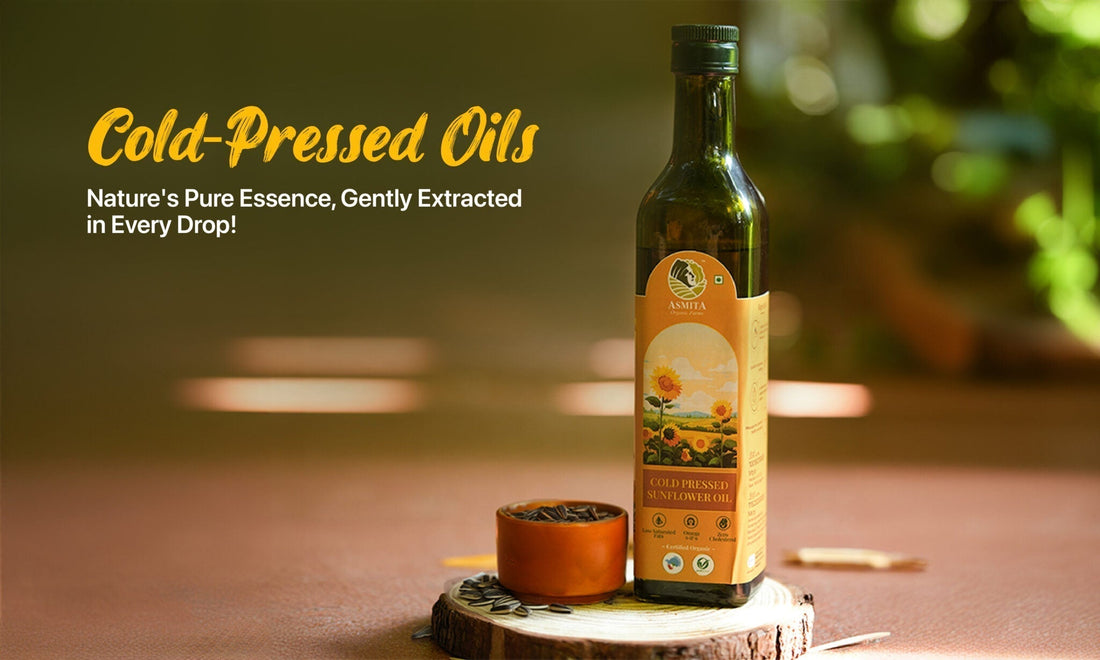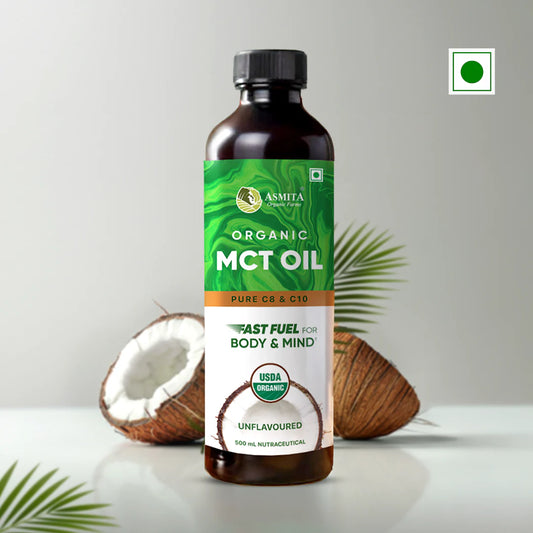Cold Pressed Oil Vs Refined Oil: Which One Is Good for Cooking?
Info Organic 5 min read
Do you also fall for the "cholesterol-free" or "heart-healthy" tags on refined cooking oil labels, thinking they are truly healthy? In today's crowded market, it's easy to be swayed by these buzzwords and glossy labels.
However, what many people don't realise is that the refining process strips away essential nutrients and natural goodness. Cold-pressed oils, on the other hand, are a purer, nutrient-rich alternative often overshadowed by the marketing hype.
So, what are refined oils, and why should they not be used for cooking? This blog post will help you understand the difference between cold-pressed oil and refined oil and their unique processing methods to answer all your questions.
Table of Contents:
- What are Refined Oils?
- What are Cold-pressed Oils?
- Making Process of Cold Pressed Vs Refined Oil
- Nutritional Differences: Cold Pressed vs. Refined Oils
- Benefits of Cold Pressed Oil Over Refined Oil
- Is Cold Pressed Oil Better for Cooking Than Refined Oil?
What are Refined Oils
Refined oil is a type of cooking oil that undergoes extensive processing to make it clear, odourless, and longer-lasting. The refining process includes several steps, such as bleaching, deodorising, and using chemicals to remove impurities.
While this makes the oil more appealing and stable for cooking at high temperatures, it also strips away many of the natural nutrients and beneficial compounds found in the original oil.
For example, vegetable cooking oils like soybean, corn, and canola oil are often refined. During the refining process, these oils lose valuable vitamins, minerals, and antioxidants. What remains is a product that may look and taste good but lacks the nutritional benefits of less processed oils.
Refined cooking oils are commonly found in most grocery stores and are used in many processed foods. They are often marketed with labels like "cholesterol-free" or "heart-healthy."
However, these labels can be misleading because the refining process can introduce unhealthy trans fats and other harmful substances. In contrast, cold pressed oils, such as extra virgin olive oil, coconut oil, and sesame oil, are considered healthy oils.
Let's take a closer look at what these oils are and the difference between cold pressed oil and refined oil.
What are Cold-pressed Oils?
Cold-pressed oil is a type of cooking oil extracted from seeds, nuts, or fruits without using heat or chemicals. This gentle extraction process helps retain the oil’s natural nutrients, flavour, and aroma, making it a healthier option compared to refined oils.
The process involves mechanically pressing the seeds or nuts to release the oil. Since no external heat is applied, the oil maintains its natural antioxidants, vitamins, and essential fatty acids. This is why cold pressed cooking oils are often considered more nutritious and beneficial for food and health.
Examples of cold-pressed oils include:
Cold-pressed Olive Oil:
Known for its rich flavour and high content of heart-healthy monounsaturated fats, extra virgin olive oil is ideal for foods like salads and low-heat cooking.
Cold-pressed Coconut Oil:
Packed with medium-chain fatty acids, it’s great for cooking, baking, and even skincare.
Cold-pressed Flaxseed Oil:
High in omega-3 fatty acids, it's best used in cold foods like salads or smoothies.
Cold-pressed Sunflower Oil:
Rich in Vitamin E and low in saturated fats, supports skin health and immunity.
Cold-pressed Groundnut Oil:
High in monounsaturated fats and antioxidants, beneficial for heart health and reducing inflammation.
Using cold-pressed oils can enhance the nutritional value of your food. They provide a more natural and wholesome alternative to refined oils, ensuring you consume foods with no additives or harmful compounds.
Recommended Article: Benefits of Cold-Pressed Oil
Let’s take a look at the production of refined oils and cold-pressed healthy oils.
Making Process of Cold Pressed Vs Refined Oil
Making Process of Cold-Pressed Oil
- Selection and Cleaning: High-quality seeds, nuts, or fruits are selected and cleaned to remove any impurities.
- Pressing: The raw materials are mechanically pressed to extract the oil. This is done at low temperatures (below 49°C or 120°F) to preserve the natural nutrients, flavour, and aroma.
- Filtration: The extracted oil is passed through a physical filter, like a strainer or cloth, to remove larger particles. Single-filtered cold-pressed oils have a more intense flavour and aroma compared to multi-filtered or refined oils. It is then bottled in glass containers to maintain freshness and nutritional value.
Making Process of Refined Oil
- Cleaning & Pressing: Seeds, nuts, or fruits are selected and cleaned to remove impurities. The raw materials are crushed and pressed to extract the crude oil. This initial oil extraction can involve higher temperatures.
- Degumming: The crude oil is treated with water or an acid to remove gums, which are unwanted substances. The oil is treated with an alkaline substance to remove free fatty acids, reducing acidity.
- Bleaching: The oil is passed through a filter with bleaching clay or activated carbon to remove colour pigments and other impurities, making it clear. The oil is then heated at high temperatures (up to 270°C or 518°F) under a vacuum to remove any odour and flavour, resulting in a neutral taste.
- Winterization (Optional): Some oils undergo winterization to remove waxes and ensure they remain clear in cold temperatures. The refined oil is filtered again and then packaged for distribution.
Choosing between cold pressed and refined oils depends on your nutritional priorities and cooking needs. Cold pressed oils offer a more natural, nutrient-rich option, while refined oils provide a longer shelf life and higher stability for high-temperature cooking.
Nutritional Differences: Cold Pressed vs. Refined Oils
Cold-Pressed Oils |
Refined Oils |
|
High (retains most vitamins, minerals, and antioxidants) |
Low (many nutrients are lost during refining) |
|
Natural, distinctive flavour and aroma |
Neutral, odourless, and tasteless |
|
Lower (suitable for low to medium heat cooking) |
Higher (suitable for high-heat cooking) |
|
High in natural antioxidants |
Reduced antioxidant content |
|
Preserves natural fatty acid profile (omega-3, omega-6) |
May alter the fatty acid composition |
|
Doesn’t contain trans fats |
Potential for trans fats due to high heat and hydrogenation |
Benefits of Cold Pressed Oil Over Refined Oil

Higher Nutrient Retention:
Cold-pressed oils retain most of their natural vitamins, minerals, and antioxidants, including Vitamin E. They also maintain their distinctive flavours, enhancing the taste of your food without artificial additives.
Due to their extensive processing, refined oils have lower nutritional content compared to cold-pressed oils.
Rich in Antioxidants:
The gentle extraction process preserves antioxidants, which help combat oxidative stress and inflammation in the body.
Cold-pressed oils preserve their natural fatty acid profile, including essential omega-3 and omega-6 fatty acids, which are beneficial for heart health and brain function.
No Chemical Residues:
Cold pressed oils are extracted without the use of chemicals, ensuring that they are healthy and free from potentially harmful residues. The low-temperature extraction process prevents the formation of trans fats, which are associated with an increased risk of heart disease.
Digestive & Skin Health:
The natural compounds and enzymes retained in cold-pressed oils, such as MCT oil, can aid digestion and promote gut health. The vitamins and antioxidants in cold-pressed oils, such as flaxseed oil or virgin coconut oil, can improve skin and hair health when used both internally and externally. To get a complete understanding of the health benefits of cold-pressed oils here.
By choosing cold-pressed oils from a reputed organic brand in India like AsmitA Organic Farms, you are opting for a more natural, nutrient-rich product that’s good for taste & your health.
Is Cold Pressed Oil Better for Cooking Than Refined Oil?
Cold-pressed oils have more benefits and are considered better for cooking than refined oils. They retain more nutrients and are extracted without heat or chemicals. They maintain their natural flavours and aromas, improving the taste of food.
For example, extra virgin olive oil has a wide range of health benefits and adds a rich flavour to salads and dressings.
However, some cold-pressed oils have a lower smoke point than refined oils. High heat can degrade their nutrients and produce harmful compounds.
Hence, depending on their smoke point and the health benefits you want, you can choose cold-pressed oils best suited for low to high-heat cooking. Cold-pressed oils may have a shorter shelf life due to the presence of natural compounds and the absence of preservatives.
Conclusion:
For health-conscious cooking that preserves nutrients and adds natural flavours, cold-pressed oils are a superior choice for low to medium-heat applications.
Explore AsmitA Organic Farms for a range of healthy cold-pressed oils for your diverse cooking needs & get them delivered to your doorstep. Made freshly in small batches, our cold-pressed oils are rich in nutritional benefits and are sourced from the finest quality ingredients from around the world.
FAQs
Are cold-pressed oils more expensive than refined oils, and are they worth the cost?
Cold-pressed oils are often more expensive due to their labour-intensive extraction process, health benefits, and higher nutrient content. However, the health benefits and superior flavour they provide can make them worth the investment for many people.
Which cold-pressed oils are good for high-heat cooking?
Cold-pressed oils like groundnut, sunflower cooking oil, and coconut oil are healthy and have higher smoke points, suitable for high-heat cooking methods such as frying and roasting.
How should I store cold-pressed oils to maintain their quality?
Cold-pressed oils should be stored in a cool, dark place, away from direct sunlight and heat. Keeping them in airtight containers can also help preserve their freshness and nutritional value.
Which cold-pressed oil is good for the skin?
Cold-pressed oils such as extra virgin olive oil, coconut oil, and flaxseed oil have excellent skincare & health benefits. They are rich in vitamins and antioxidants, which help moisturise, nourish, and protect the skin.



